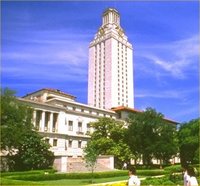Investment strategy shifting at UT
August 3, 2008
University of Texas regents are setting a new course for the state's flagship school, a bolder approach more familiar to hard-charging investment firms than staid public university boards.
Written by Editorial Board, Austin American-Statesman

University of Texas regents are setting a new course for the state's flagship school, a bolder approach more familiar to hard-charging investment firms than staid public university boards.
In recent months, the UT System Board of Regents has pushed hard on a plan to redevelop the Brackenridge tract in West Austin. It might relax ethics rules for UTIMCO, its investment arm. And it is considering selling part of the university's oil and gas leases for an immediate payment rather than collect income annually, as it has done for decades.
There's some financial risk involved, but the regents are also gambling with the public's perception of the university. Planning for the favored Brackenridge tract already has prompted protests, and easing ethics rules for managers of the investment company summons unpleasant memories of past questionable dealings.
But the plan to sell some of UT's gas and oil reserves for $1 billion is the biggest gamble. UT has received royalties from those leases for 85 years, part of a $25 billion endowment that helped push UT into the top tier of public universities.
To suddenly alter that system is a radical departure. The regents are, in effect, betting that the $1 billion prepayment will be more profitable than annual royalties. But if oil and gas prices rise, the regents will have sold those commodities for less than they could have earned from them.
Such risk-reward plays are familiar to aggressive investors, like those now leading the UT regents. Chairman H. Scott Caven of Houston manages a private investment firm; Vice President James R. Huffines of Austin is a commercial banker and investor; Vice President Robert B. Rowling is a billionaire investor and chairman of a diversified holding company based in Irving. There are no nurses, teachers or small-business owners on this board.
Rowling is also chairman of UTIMCO, a board of private equity managers, investment firm owners and corporate executives that manages the $25 billion endowment. The board recently voted to abandon a rule that bars directors from investing their own money in the same companies and funds as UTIMCO. The change could be approved by the regents this month.
The ban on co-investing began after allegations that the UTIMCO board had steered investments to funds run by friends and associates of Dallas financier Tom Hicks, then a UT regent and UTIMCO chairman. Hicks denied any improprieties but resigned in 1999 after the investments were questioned.
Charles Tate, one of the partners in Hicks' firm of Hicks, Muse, Tate and Furst at the time, is a UTIMCO board member. Tate, a generous UT benefactor, now is chairman of the private equity fund Capital Royalty LP.
The regents' aggressive strategy is grounded in making more money for UT. A task force reported that the university could earn millions by leasing the Brackenridge tract for higher uses like commercial property, condominiums or a resort. Relaxing the ethics rule ostensibly would allow UTIMCO and its board members to share in investments with a potential for strong returns. And the oil and gas sale would quickly yield $50 million a year for the UT and Texas A&M systems.
But to reap those benefits, the regents are contemplating fundamental changes in tradition. Gambling on big returns can be a good strategy for private investors, but the regents are managing public money and must consider not only what is profitable but what is right and wise.
They are guiding this state's leading institution of higher learning, and its mission is greater than maximizing profits at any cost.
![]()
![]()
Related Stories
![]()
Fair Use Notice
This site contains copyrighted material the use of which has not always been specifically authorized by the copyright owner. We are making such material available in our efforts to advance understanding of environmental, political, human rights, economic, democracy, scientific, and social justice issues, etc. We believe this constitutes a "fair use" of any such copyrighted material as provided for in section 107 of the US Copyright Law. In accordance with Title 17 U.S.C. Section 107, the material on this site is distributed without profit to those who have expressed a prior interest in receiving the included information for research and educational purposes. For more information go to: http://www.law.cornell.edu/uscode/17/107.shtml. If you wish to use copyrighted material from this site for purposes of your own that go beyond "fair use", you must obtain permission from the copyright owner.